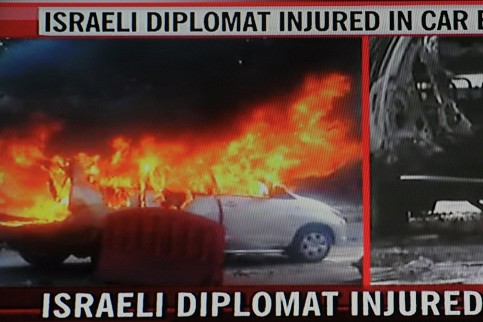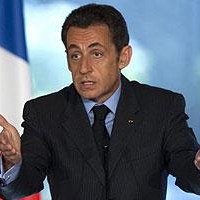![]()
Analysis of the Iranian and Hezbollah Terrorist Attacks against Israeli Targets Abroad: The Situation on the Ground and Background Information[1] by The Meir Amit Intelligence and Terrorism Information Center, full version, febr. 15, 2012. This article is published in four parts, due to its length. Please visit ITIC for more information.
Overview
For the past half year (May 2011-February 2012) Iran and Hezbollah have organized and carried out a terrorist campaign against Israeli targets abroad. So far six attacks have been attempted in five Asian countries, four in sequence (Turkey, Azerbaijan, twice in Thailand) and two simultaneously (India and Georgia). Several methods were employed, the most conspicuous of which, according to information made public so far, was the attaching of a magnetic explosive device to a vehicle (or vehicles) mainly used, in our assessment, by representatives of the State of Israel.
Iran (through the Quds Force and other apparatuses linked to the regime) conducts a global terrorist campaign against countries and individuals it perceives as its enemies: the United States and the West, Israel and the Jewish people, Saudi Arabia and other pro-Western Arab countries, and Iranian and foreign figures who oppose the Iranian regime. Hezbollah and foreign operations apparatus serve as the main Iranian proxy, handled by the Iranians for subversion and terrorism in the Middle East and around the globe. Both the Iranians and Hezbollah repeatedly and strongly deny involvement in terrorism and subversion around the globe.
During the past year the Iranian terrorist campaign has faced a succession of failures, caused, in our assessment, by their low professional capabilities and perhaps also by haste and excessive motivation to carry out terrorist attacks regardless of the cost. One example was the prevention of the attempted assassination of the Saudi Arabian ambassador to the United States.[2] Others were the series of prevented or failed attempts to attack Israeli and Jewish targets abroad in revenge for the deaths of Iranian nuclear scientists and of Imad Mughniyeh, attributed by the Iranians and Hezbollah to Israel. However, it seems that despite their failures the Iranians (and Hezbollah) are determined to continue their terrorist campaign against Israel and other countries they perceive as their enemies, for both “revenge” and deterrence, and to send the entire world a message regarding Iran’s potential for terrorism around the globe.
During the past half year, six terrorist actions which Iran and Hezbollah tried to carry out in five countries were exposed. Five of them either failed or were prevented and one in India was successful:
1) Turkey: On May 26, 2011, there was an attempted attack on the life of David Kimchi, the Israeli consul in the heart of Istanbul. The attack failed but wounded eight Turkish civilians, and might have been a so-called “work accident.” According to the Italian Corriere della Sera, July 2011, the Turkish authorities concluded that the attempted assassination had been carried out by three Hezbollah operatives who had arrived from Beirut. They followed the consul’s daily routine, in our assessment intending to attack him on his way to the consulate.
2) Thailand: In the middle of January, 2012, an attack against an Israeli target in Bangkok was prevented, apparently a venue customarily frequented by Israelis. On January 12, Thai police at the Bangkok airport arrested Hussein Atris, a Shi’ite Hezbollah operative from south Lebanon, as he was trying to flee the country. In his possession were a Lebanese and an expired Swedish passport. During the investigation the Thai police uncovered a supply of chemicals for manufacturing explosives for the attack/attacks.
3) Azerbaijan: On January 24, 2012, a three-man Azeri terrorist cell was exposed, run by Iran. They planned to attack both the Israeli ambassador to Azerbaijan as well as two Chabad emissaries, the director and head rabbi of the local Jewish school. The cell has handled by an Azeri living in the city of Ardabil in northwestern Iran, and wanted by the authorities in Azerbaijan for kidnapping, murder and arms smuggling. The Azeri, handled by the Iranians, promised the cell $150,000 and in October 2011 smuggled weapons to them (including a sniper rifle with a silencer, three hand guns with suppressors and plastic explosives).
4) India: At 15:00 hours on February 13, 2012, a day after the anniversary of the death of Hezbollah’s senior terrorist operative Imad Mughniyeh, a motorcyclist attached an explosive device to the car of an Israeli Ministry of Defense representative in New Delhi. In the car were the local driver and the wife of the Israeli Ministry of Defense representative, who was seriously wounded. Of the series of six attempted attacks initiated by Iran and Hezbollah, it was the only one which was carried out and harmed an Israeli. The Indian media reported that the police had detained five men for interrogation who had been detected by security cameras as they examined the Israeli car. The Indian media also reported that the motorcycle had been found abandoned near the site of the attack.
5) Georgia: On February 13, 2012, the same day as the attack in New Delhi, an explosive device was attached to an Israeli embassy car in the capital city of Tbilisi. A Georgian employee of the Israeli embassy driving an embassy car felt the car was dragging something behind it. He alerted the police, whose demolition experts neutralized the bomb. The Israeli prime minister accused Iran and Hezbollah of responsibility for the attacks in Tbilisi and New Delhi, following those in Azerbaijan and Thailand. The Iranians, however, denied any and all involvement in the attacks in India and Georgia, and accused Israel of planning the attacks itself to incite world public opinion against Iran.
6) Thailand: At 14:00 hours on February 14 a bomb exploded in a rented apartment in Bangkok near the Israeli embassy, possibly a so-called “work accident.” The explosion revealed the existence of an Iranian terrorist cell of at least four operatives. Two men fled the scene in a taxi. Another left the apartment five minutes later, threw an explosive device at a taxi and then another at a police car. The device thrown at the police car ricocheted and exploded, critically wounding him. The injured man was identified as carrying an Iranian passport. The same day, the Thai police arrested a third operative who also held an Iranian passport and was planning to flee the country to Malaysia. On February 15, a third operative was detained in Malaysia with an Iranian passport, who was supposed to fly to Tehran. Another suspect is a woman named Leila Rohani, who managed to escape to Iran. A search of the apartment in which the explosion occurred revealed four kilos (8.8 pounds) of plastic explosives and two radios. In our assessment, the detained Iranians belonged to a terrorist squad which was planning to attach an explosive device to an Israeli vehicle.
Appendices
Three appendices follow with information and background about Iran and Hezbollah’s subversion and terrorist activities in the three of the five arenas in which the terrorist campaign is being waged against Israel:
1) Appendix I: Turkey as an arena for Iranian and Hezbollah terrorism and subversion. (Published at CrethiPlethi.com under the title “Turkey as an arena for Iranian and Hezbollah terrorism and subversion“)
2) Appendix II: Thailand and Southeast Asia as arenas for Iranian and Hezbollah terrorism and subversion. (Published at CrethiPlethi.com under the title “Thailand and Southeast Asia as arenas for Iranian and Hezbollah terrorism and subversion“)
3) Appendix III: Azerbaijan as an arena for Iranian and Hezbollah terrorism and subversion. (Published at CrethiPlethi.com under the title “Azerbaijan as an arena for Iranian and Hezbollah terrorism and subversion“)
![]()
Notes:
[1] Full version.
[2] For further information see the November 3, 2011 bulletin “The United States foiled an Iranian plot to assassinate the Saudi ambassador in Washington using Quds Force, a Revolutionary Guards elite unit…”



 RSS
RSS











Latest Comments
Hello Mike, Thank you for your positive feedback to the article. I felt there wasn’t too much critical analysis of ...
Thanks for this considered and well constructed article. A follow up article on the manner in which the editorial contro...
THE CLUELESSNESS OF CLAIMING THAT OBAMA'S MIDDLE EAST POLICIES WERE A FAILURE CANNOT BE FURTHER FROM THE TRUTH, WHAT THE...
As long as Obama is the president of the usa do not trust the us government......
Thank you for an good read....